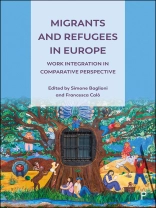EPDF and EPUB available Open Access under CC-BY-NC-ND licence.
The motivations of migrants for travelling to Europe vary, and the quality of the processes involved in their settlement and contribution to social and economic development are inextricably linked to their prospects of finding and sustaining good-quality work.
This book explores the labour market integration of migrants, refugees and asylum seekers across seven European countries: the Czech Republic, Denmark, Finland, Greece, Italy, Switzerland and the UK. Using empirical data from the Horizon2020 SIRIUS Project, it investigates how legal, political, social and personal circumstances combine to determine the work trajectory for migrants who choose Europe as their home.
Содержание
1. Introduction — Simone Baglioni and Francesca Calò
2. What do the numbers say about migration in European economies? — Christos Bagavos, Konstantinos N. Konstantakis, Panayotis G. Michaelides and Theocharis Marinos
3. Legal frameworks — Veronica Federico
4. Welfare regimes and labour market integration policies in Europe — Nathan Lillie, Ilona Bontenbal and Quivine Ndomo
5. Civil society organisations and labour market integration: barriers and enablers in seven European countries — Dino Numerato, Karel Čada and Karina Hoření
6. Social partners: barriers and enablers — Simone Baglioni, Tom Montgomery and Francesca Calò
7. The ‘back-stepper’ and the ‘career diplomat’: turning points of labour market integration — Irina Isaakyan, Simone Baglioni and Anna Triandafyllidou
8. The policy dimension: lessons learnt and ways forward — Maria Mexi
Об авторе
Francesca Calò is Lecturer in Management in the Department of Public Leadership & Social Enterprise, Faculty of Business and Law, at The Open University, UK. She was the UK researcher and project manager of the EU funded Sirius project.












